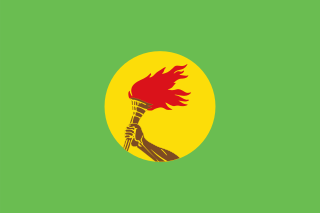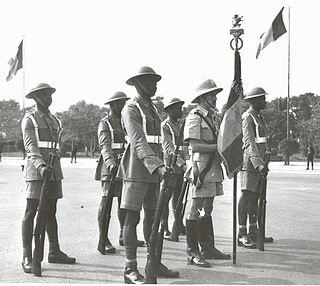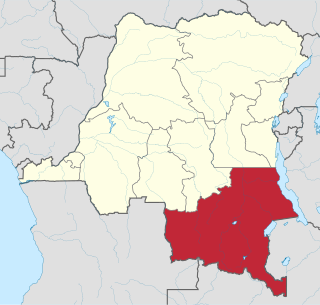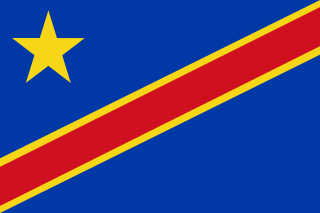The Armed Forces of the Democratic Republic of the Congo is the state organisation responsible for defending the Democratic Republic of the Congo. The FARDC was rebuilt patchily as part of the peace process which followed the end of the Second Congo War in July 2003.
The Armed Forces of the Republic of the Congo, also less formally denoted as the Forces armées congolaises or its acronym FAC, are the military forces of the Republic of the Congo. They consist of the Congolese Army, the Congolese Air Force, the Congolese Marine (Navy), and the Congolese National Gendarmerie. The dissolution of French Equatorial Africa in 1958, and France's impending military withdrawal from the Congo in August 1960, provided the impetuous for the formation of the FAC. The FAC and state paramilitary agencies are headed by an Armed Forces Chief of General Staff, usually appointed by the President of the Republic of the Congo. Major General Guy Blanchard Okoï has served as chief of staff since 2012.

Zaire, officially the Republic of Zaire, was a Congolese state from 1971 to 1997 in Central Africa that was previously and is now again known as the Democratic Republic of the Congo. Zaire was, by area, the third-largest in all of Africa, and the 11th-largest in the world. With a population of over 23 million inhabitants, Zaire was the most-populous officially Francophone country in Africa, as well as one of the most populous in Africa.
Banyamulenge, also referred to as nyamurenge and banyamurenge is the name that describes a Tutsi community in the southern part of Kivu, Democratic Republic of the Congo. The Banyamulenge of South Kivu are culturally and socially distinct from the Tutsi of North Kivu. Most Banyamulenge speak Kinyamulenge, which is a mixture of Kinyarwanda and Kirundi with specific phonological and morphological features not found in the latter two.

The Alliance of Democratic Forces for the Liberation of Congo-Zaire was a coalition of Rwandan, Ugandan, Burundian, and Congolese dissidents, disgruntled minority groups, and nations that toppled Mobutu Sese Seko and brought Laurent-Désiré Kabila to power in the First Congo War. Although the group was successful in overthrowing Mobutu, the alliance fell apart after Kabila did not agree to be dictated by his foreign backers, Rwanda and Uganda, which marked the beginning of the Second Congo War in 1998.

The First Congo War (1996–1997), also nicknamed Africa's First World War, was a civil war and international military conflict which took place mostly in Zaire, with major spillovers into Sudan and Uganda. The conflict culminated in a foreign invasion that replaced Zairean president Mobutu Sese Seko with the rebel leader Laurent-Désiré Kabila. Kabila's uneasy government subsequently came into conflict with his allies, setting the stage for the Second Congo War in 1998–2003.

The Force Publique was a gendarmerie and military force in what is now the Democratic Republic of the Congo from 1885, through the period of Belgian colonial rule. The FP was retitled as the Congolese National Army or ANC in July 1960 after independence.
The Agence Nationale de Renseignements (ANR) is a government intelligence agency of the Democratic Republic of the Congo. The role of the agency is to ensure "internal security and external security" of the state. The agency was strongly criticized for the disrespect of human rights by several organisations. Inzun Kakiak has led the agency since 2019.
The law enforcement in the Republic of the Congo is monitored by two organisations Congolese national gendarmerie and the Congolese national police.

The Congolese National Liberation Front is a political party funded by rebels of Katangese origin and composed of ex-members of the Katangese Gendarmerie. It was active mainly in Angola and Zaire during the 1970s.

The Republic of the Congo was a sovereign state in Central Africa, created with the independence of the Belgian Congo in 1960. From 1960 to 1966, the country was also known as Congo-Léopoldville to distinguish it from its northwestern neighbor, which is also called the Republic of the Congo, alternatively known as "Congo-Brazzaville". In 1964, the state's official name was changed to the Democratic Republic of the Congo, but the two countries continued to be distinguished by their capitals; with the renaming of Léopoldville as Kinshasa in 1966, it became also known as Congo-Kinshasa. After Joseph Désiré Mobutu, later Mobutu Sese Seko, commander-in-chief of the national army, seized control of the country, it became the Republic of Zaire in 1971. It would again become the Democratic Republic of the Congo in 1997. The period between 1960 and 1964 is referred to as the First Congolese Republic.

This is a list of Chiefs of Staff of the armed forces of the Democratic Republic of the Congo and Zaire.

The Congolese National Police is the national police force of the Democratic Republic of the Congo. The national police consists of 110,000–150,000 officers and operates on the provincial level, answering to the Interior Ministry. It is known in the DRC for corruption, repression of political dissidents, and other human rights abuses. It is currently undergoing reforms. A police academy is being built.

Marcel Antoine Lihau or Ebua Libana la Molengo Lihau was a Congolese jurist, law professor and politician who served as the inaugural First President of the Supreme Court of Justice of the Congo from 1968 until 1975 and was involved in the creation of two constitutions for the Democratic Republic of the Congo.
Louis de Gonzague Bobozo was a Congolese military officer who served as commander-in-chief of the Armée Nationale Congolaise from 1965 until 1972.
The Katangese Tigers or the Tigres are Katangese fighters.

The Zairian Civil Guard was a militarised police force in Zaire, created to support the regime of Mobutu Sese Seko.

The Katangese Gendarmerie, officially the Katangese Armed Forces, was the paramilitary force of the unrecognized State of Katanga in Central Africa from 1960 to 1963. The forces were formed upon the secession of Katanga from the Republic of the Congo with help from Belgian soldiers and former officers of the Force Publique. Belgian troops also provided much of the early training for the Gendarmerie, which was mainly composed of Katangese but largely led by Belgians and later European mercenaries.

Frédéric Vandewalle was a Belgian colonel and diplomat in the Belgian Congo and independent Congo. He was an influential figure right before and after Congo's independence from Belgium. He was one of the organisers of the Katangese secession and led Operation Ommegang against the Simba rebellion during the Congo Crisis. His precise role in the assassination of Patrice Lumumba is the subject of debate among historians.
André Kisase Ngandu was a Congolese rebel leader. An insurgent in the Simba rebellion of the 1960s, he immigrated to East and later West Germany where he lived for many years. He resumed his rebel activity with Ugandan support in the 1990s and emerged as leader of the National Council of Resistance for Democracy (CNRD) which waged an insurgency in eastern Zaire.












